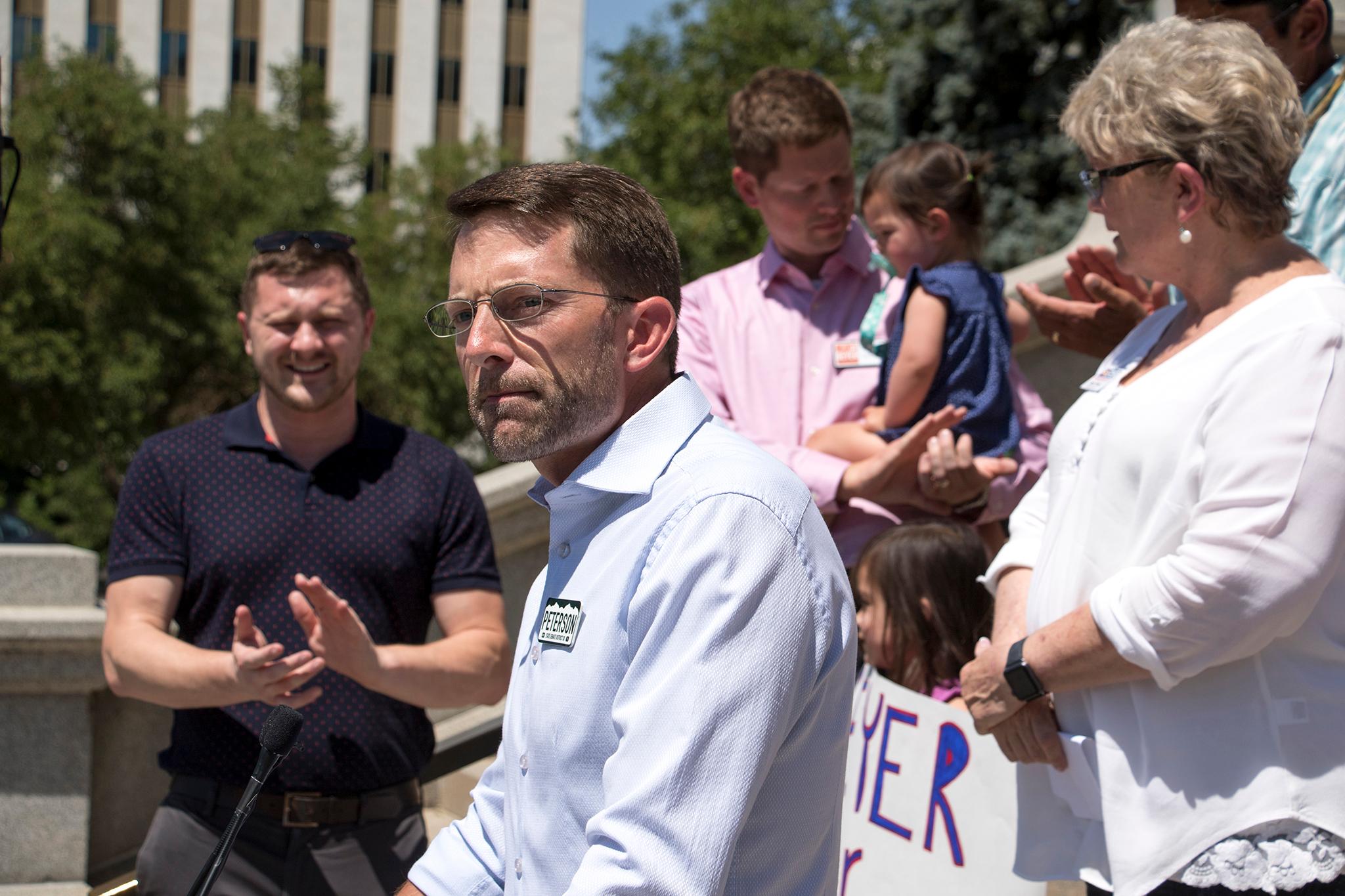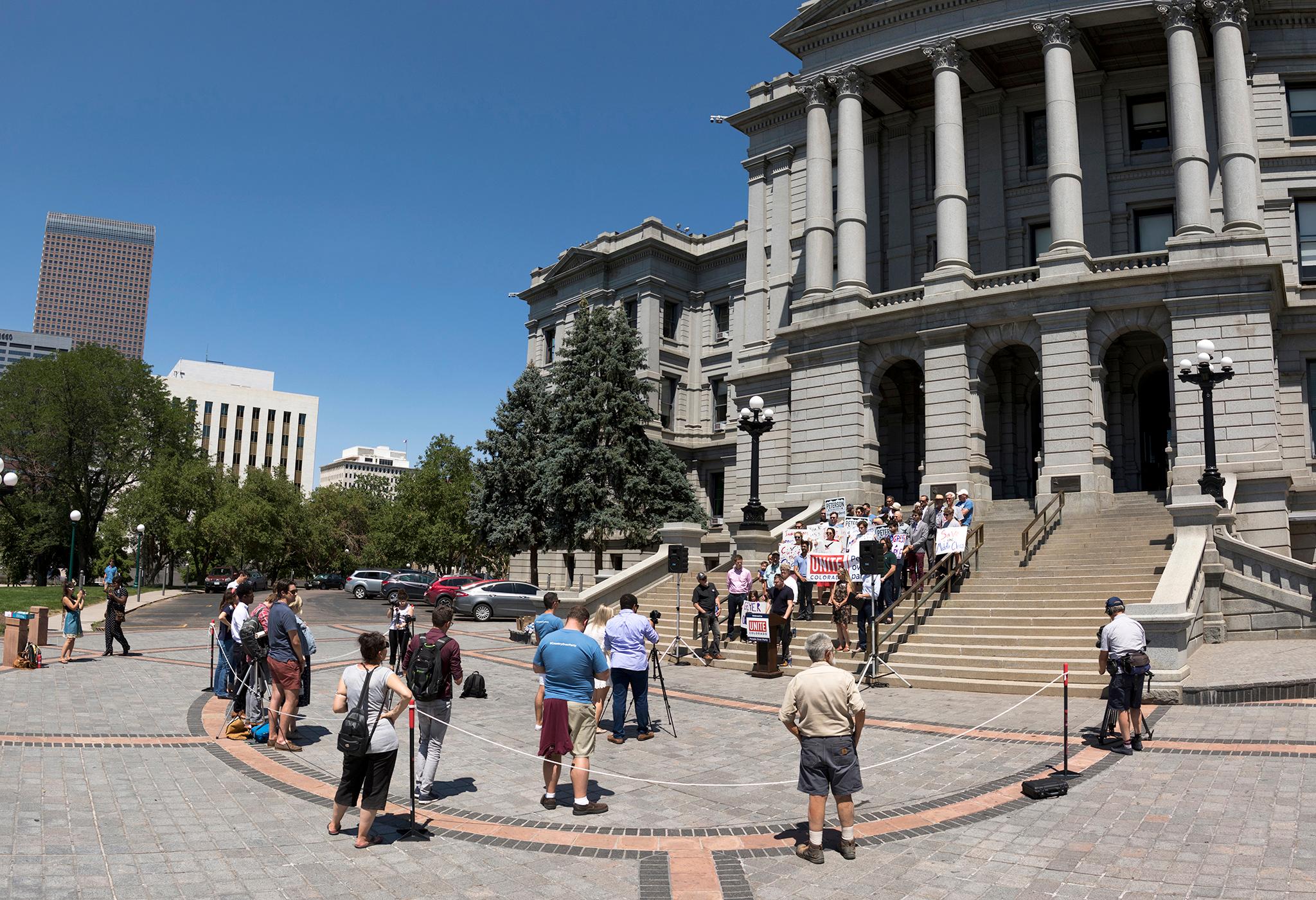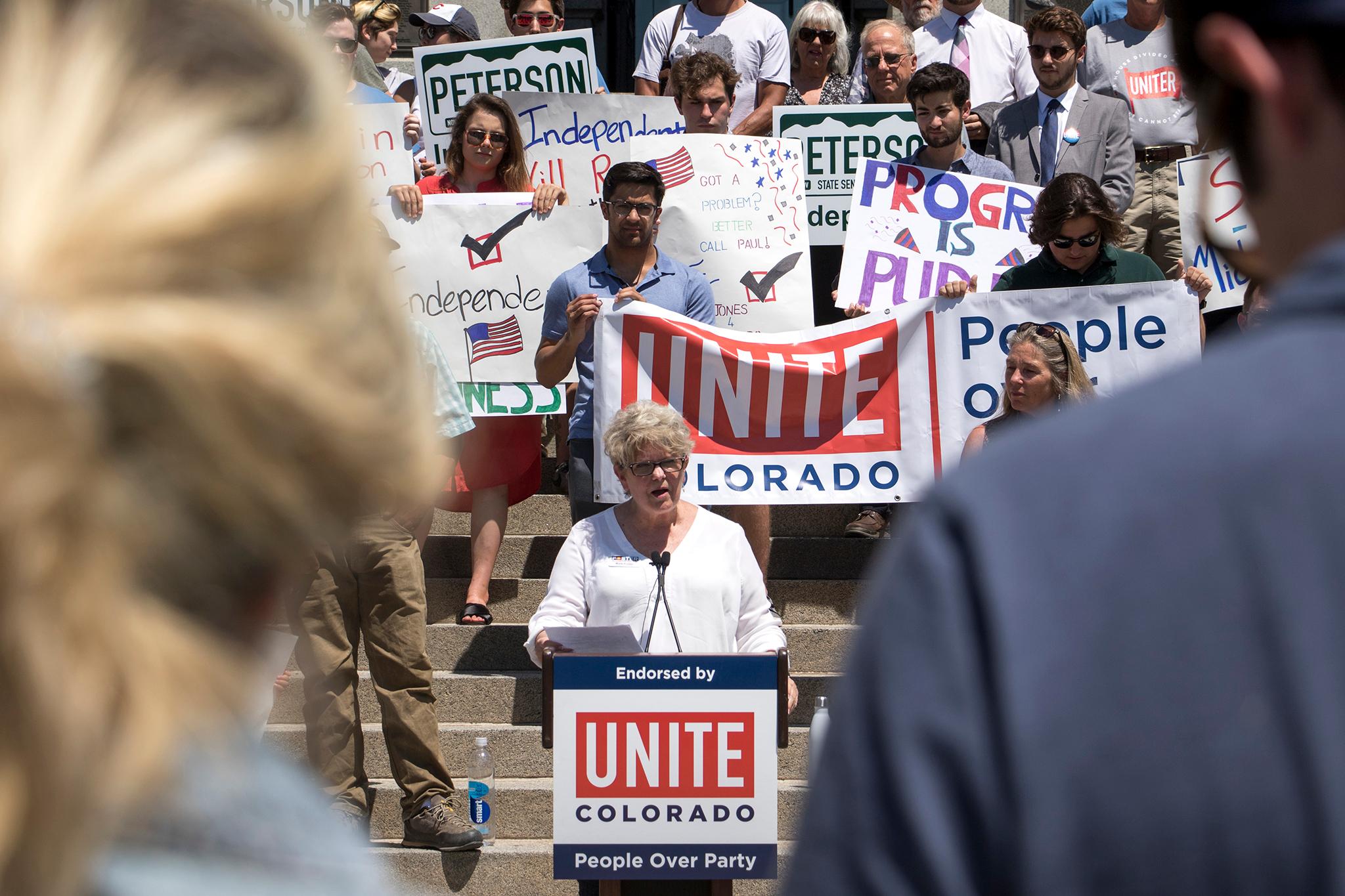"Hey, how many independents fit in an elevator?" a woman asked as the doors of a lift slid closed in downtown Denver on Monday afternoon.
The joker was Thea Chase, a town board member in Palisade. And the answer, apparently, was eight. Four non-partisan political candidates and four of their supporters had crowded aboard for a ride to the Colorado Secretary of State's office. A fifth candidate waited on the ground floor.
Together, they represented the grand ambitions of Unite Colorado -- a group that says it will break the state's gridlock by creating a new political force that is neither Democratic nor Republican. They've met skepticism from players on both sides, and plenty of derision, but they were carrying boxes filled with 4,000 ballot signatures: enough, they say, to make the ballots.
First, the unaffiliated elevator car stopped at the third floor of the Wells Fargo Center. The group's political director, Andrew Short, stepped out and searched in vain for the government office where the candidates would file their election papers. Then they tried the fifth floor.
"How many independents does it take to find the secretary of state's office?" quipped Chase, who is running for House District 54 in the state legislature.
Here was a brand-new group, trying quite literally to find their ways around the halls and elevators of power. They were fresh from a press conference on the baking hot steps of the Colorado State Capitol, where speakers declared a "historic" day for a new movement in Colorado, although there were only a couple dozen people listening.
After a few minutes, they found the right office, and promptly discovered they were missing just one more notarized form.
Around Colorado, there are at least 13 independent and unaffiliated candidates running for seats in the state legislature. Unite Colorado has endorsed five of them. History says they face long odds: It has been about 50 years since an unaffiliated candidate won election to the statehouse, according to Nick Troiano, the executive director of Unite America.
"But the wind is at our back," he said in an interview
Since June 2016, Colorado's population of unaffiliated voters has grown by 22 percent, compared to a 7 percent gain for the Democrats and 2 percent for the Republicans. Unaffiliated voters significantly outnumber either party. The group (formerly known as The Centrist Project) says this is evidence that the public is increasingly disgusted with the two-party system.
Their stated plan is to introduce a small but effective corps of independent legislators. They call it the "fulcrum" strategy -- to amplify their influence by establishing themselves as the moderators. If they get the right numbers, the parties would have to come to them to complete a majority.
"The ultimate goal is to elect enough — between three to five — to control the balance of power," said Troiano, who himself ran as an independent for U.S. Congress in 2014.
In the office of the secretary of state, most of those potential power balancers were just getting to meet each other. They included a former game warden, two Republicans who have given up on their party, a town board member with a resume of business advocacy, and a longtime unaffiliated candidate in Colorado Springs.
"We are going to bushwhack. We are going to make our own trail," Steve Peterson had declared on the Capitol steps. His fellow candidates talked about making Election Day into Independence Day -- or was it independents' day? -- and fighting back "against the two-party system that divides us."

So far, the two-party system is staying pretty quiet about all this.
Representatives for both the Democrats and Republicans in the statehouse declined to comment. But, behind the scenes, political operatives are passing around information, theories and an unsigned memo about the new group.
Altogether, Unite Colorado is backing four House candidates and one Senate candidate in far-flung districts.
In the Senate, the group chose Peterson in Senate 30. It's a deep-red seat where the Republican incumbent won by nearly 30 percentage points in 2014. Challenger Peterson says he's "socially liberal and fiscally conservative," an alternative to what he describes as a Senate caucus that has lost sight of limited-government values.
Losing that seat would damage Republicans' tenuous one-seat majority in the Senate. (The Democrats already lost a seat when Sen. Cheri Jahn became an independent last year, but she still supports the party agenda.)
In the House, the group is pursuing the following seats:
- Maile Foster is running for an open seat in El Paso County, House District 18. Democrats won the last few elections by 10 to 15 points.
- Jay Geyer is challenging Democrat Matt Gray in Boulder and Broomfield counties, House District 33. Democrats have won by 7 to 10 points in recent elections.
- Thea Chase is running for an open Republican seat in Delta and Mesa counties, House District 54. Outgoing representative Yeulin Willett, a Republican, dominated his elections by 40-plus points, though a libertarian candidate came close in 2012.
- Paul Jones is challenging Democrat Barbara McLachlan in southwestern Colorado, House District 59. She won by less than 2 percentage points in 2016, unseating a Republican.
So, the pattern this year is that Unite Colorado is getting involved in solidly Republican districts, while it's challenging Democrats in competitive districts. Seeing this, some Democratic insiders have complained about a "spoiler effect," where the unaffiliated candidates could sap away voters in their tight races.
"People are convinced, convinced, in the parties that this is a wolf in sheep’s clothing," said Troiano, the group's director.
But he pushed back against the idea that they're trying to undermine one party or another."We're here to win races, period. Democrats say we're going to take away Democratic votes and Republicans say we're going to take away Republican votes, and they're both correct for once," he wrote in an email to Denverite.
Troiano claims that the independent candidates have a fighting chance even in the "safe" districts, despite the Republicans' seeming dominance. The group's challengers against Republicans seem to skew libertarian in their values, meaning they could shave off disaffected voters from the party of Trump.
"The Democrats are convinced they cannot win in my district. The Republicans are convinced they cannot lose," Peterson said.
One more piece of evidence against a conspiracy: the group's leadership.
Troiano has worked at a series of political groups that target unaffiliated voters. A Washington Post profile in 2014 described him as a "fiscal conservative who adheres to the core Republican values of limited government and personal responsibility."
Meanwhile, the group's Colorado political director, Andrew Short, previously worked as the executive director of the Democratic Senate Campaign Fund, and for the ACLU of Colorado as well as for a union group.
The other question is what exactly these candidates will do if they're elected.
Unite Colorado found these candidates through a statewide search process. Jones was introduced by a colleague after he started writing letters to the editor in his local newspaper, and then the group asked him to run. Chase was contacted directly. Geyer's wife saw a news article.
"The gridlock was jut really frustrating," said Chase, who has worked for decades in business incubators and other support organizations on the Western Slope. "It really resonated with me."
The group searched for people with good character, credibility, viability, and "an approach to government that was very focused on finding common ground," Troiano said. Take notice that there's nothing there about taxes, guns or health care.
Seth Masket, the political analyst, wrote last year that the group "doesn't really seem to have much of a platform," except for "vague commitments to fiscal responsibility and environmental stewardship."
So, I asked four of the candidates how they would tackle some of the state's biggest issues. Some tended to avoid taking hard stances on the "litmus tests" that define conservatives and liberals. (Although, in fairness, lots of politicians do that.)
"The dysfunction we're campaigning about is at the root of all this," said Geyer, the Broomfield-Boulder candidate who teaches ethics and environmental justice at CU Boulder. "These may seem like platitudes, but that's the start of a real political bloc that's somewhere between the two parties on a lot of issues."
And the candidates did offer up specific policy positions when I asked. For Geyer, it's oil and gas regulation. He wants communities to have more consent. Peterson wants to change the education system to reward high-performing teachers, and he wants to specifically increase road funding. Jones wants to work with rural landowners to protect open space, and he wants some changes to TABOR. Chase wants to boost small businesses.
But what they don't have is a specific, shared policy platform on many of the state's biggest issues. "A collection of independents rarely agree on anything," Peterson told me.

And some see that as a potential weakness.
Masket thinks the "fulcrum strategy" is "an interesting approach and certainly more plausible" than other centrist groups' plans. But wildcard independents could slow down lawmaking if they're too unpredictable, he warned last year.
Ellen Dumm, a political consultant who works with progressive and nonprofit organizations, is skeptical of the group. "There’s no belief system that is overarching with unaffiliateds, which is one of the reason that unaffiliateds have never been successfully organized in the past, and it’s doubtful that they will this time," she said.
"There’s some good people who I think honestly believe that this will somehow moderate Colorado politics — but overall I’m not seeing an implementation of a strategy. It’s more, 'We’re grabbing whoever we want, and anybody who looks somewhat viable.'"
And I also wondered: If these candidates don't share some ideological values, will they really be able to work together to break gridlock? Won't they just split apart and side with one party or another?
That remains to be seen, Troiano told me. "There are many layers to this experiment," he said. They've already proved they can recruit candidates. And the candidates bringing in some money -- tens of thousands for each race, enough to give the independent candidates a head-start in fundraising, as 9News reported. And they'll try to build momentum with a national "Unite Summit" in Denver on Aug. 17 to 19.
Now, it's time to see if voters have an appetite for independence. "The biggest barrier we face is psychological," Troiano said. "It will happen if voters believe it can happen, but people fear wasting their vote or spoiling the elections."
Down in Gunnison County, Jones thinks of his friends whom he describes as defying cultural stereotypes -- the pacifist who shoots pistols, or the mountain bikers who hunt elk.
"If my message resonates with independents and those more centrist democrats," he said, "I think I have a real shot at being more than a spoiler."












